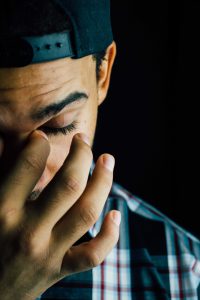In my experience, some of the most common things that bring people into my office are symptoms of depression. However, often people are not quite able to articulate them as such.
 Colloquially, we use “depressed” to mean sad. While sadness is a symptom of depression – often the biggest and most salient – it is not the only one. Further, there are many different types of depression that can manifest in different ways.
Colloquially, we use “depressed” to mean sad. While sadness is a symptom of depression – often the biggest and most salient – it is not the only one. Further, there are many different types of depression that can manifest in different ways.
My goal here is to walk you through some different types and symptoms of depression so that you might piece together a better idea of what is afflicting you. Next, I hope that I can convince you to help seek out treatment by not only giving you options but addressing how these options work towards building recovery for you.
Major Depressive Disorder
The first broad type of depression to look at is Major Depressive Disorder. Major Depressive Disorder is generally what is being referred to when people say “clinical depression.” When somebody comes into my office indicating they are feeling sad or depressed, this is what my brain is looking at.
More than just a sadness, Major Depressive Disorder indicates that something called a Major Depressive Episode has occurred. This might seem redundant, but I will explain why the distinction exists later. The hallmark symptoms of a major depressive episode include either a depressed mood, or a lack of interest in pleasure, and both can be present.
However, sometimes it can just be the lack of interest or pleasure, without the sadness. At times this feels like a lack of motivation or losing interest in hobbies you once had. It is this second symptom that often tricks people into thinking they are experiencing something that wouldn’t qualify or be as “serious” as depression. However, that lack of motivation for so many is the central problem that they are experiencing!
Other symptoms of Major Depressive Disorder include changes in weight, issues with sleep, agitated movements or slowed down movements. All of these symptoms can go in either the “too much” or “not enough” direction. Major Depressive Disorder affects us not only in the emotional/psychological level but interferes with our bodies’ abilities to regulate themselves as well.
The rest of the diagnostic symptoms include a lack of energy, lack of concentration abilities, and thoughts of death and/or thoughts of suicide. Then, all of these symptoms are wrapped in the package of, do they “cause clinically significant distress or impairment in social, occupational, or other important areas of functioning,” and not as the result of a substance, medication, or other medical condition?
I imagine that if you are experiencing any one of the aforementioned symptoms, let alone combinations of them, you will be feeling pretty darn distressed! Major Depressive Disorder comes with some other qualifiers, but don’t sweat those, as they are for the therapists and doctors to worry about and figure out. If you feel like you have met some of those symptoms, get in and talk to a therapist soon!
Bipolar Disorder I and II
 The next major class of depression consists of Bipolar Disorder. This is a disorder wherein you have met the classifications of a Major Depressive Episode, but you have ALSO at some time experienced what is known as “mania.”
The next major class of depression consists of Bipolar Disorder. This is a disorder wherein you have met the classifications of a Major Depressive Episode, but you have ALSO at some time experienced what is known as “mania.”
Mania is described as “a distinct period of abnormally and persistently elevated, expansive, or irritable mood and abnormally and persistently increased activity or energy, lasting at least 1 week and present most of the day, nearly every day (or any duration if hospitalization is necessary).” Mania is basically a high energy swing in the opposite direction from depression.
Usually there will be a mix of symptoms that include feeling incredibly positive about yourself, a lack of a need to sleep, being very chatty, a racing mind, being easily distracted, seeking out big goals and projects, and/or a propensity to seek out risky situations, such as drug use or unsafe sexual practices.
While in mania, people often generally feel quite good and it isn’t seen by them as an issue at the moment. In fact, most would choose to live in this state if they could because it can feel so good! However, usually there are consequences, and when you come out of the mania those can come back to bite you.
Suddenly you have five thousand on your credit card from that online shopping spree, or you were so amped up you scared your children and spouse. While it feels good in the moment, the consequences can be quite painful and trigger a swing in the opposite direction of deep depression.
Now earlier I made the distinction between a Major Depressive Episode and Major Depressive Disorder, and this is where that is important. People with Bipolar Disorder I have experienced both a Major Depressive Episode and a Manic Episode, as described above. Even if it was just one time and most of your experience has been depressed, if you have ever had one manic episode you fit the criteria for Bipolar Disorder.
A person suffering from Bipolar Disorder II also has experienced a Major Depressive Episode, but the manic episode wasn’t quite as strong. This is called “hypomania.” In these cases, the mania usually doesn’t last very long and isn’t as extreme. For those with Bipolar Disorder II, the depression often isn’t quite as bad either. In general, think Bipolar Disorder I = extreme swings, Bipolar Disorder II = less extreme, but still with swings.
One final note on Bipolar Disorder: often we will colloquially use the term to describe mood swings or changing our minds a lot. Usually, these mood swings last at least a few days, more often weeks or months at a time. If you or a loved one are swinging back and forth incredibly quickly, multiple times a day, you might be experiencing something else like a Borderline Personality Disorder, which is a whole different ballgame as far as treatment and medication are concerned.
Dysthymia and Cyclothymia
This third realm of Depression represents a “lesser” state of depression and cycling moods. The symptoms of the above depressions are similar to those in Dysthymia and Cyclothymia, however, they are experienced at a lower grade. While the intensity of Dysthymia may be less than that of Major Depressive Disorder, the time frame is much longer.
 Usually, Major depressive disorder will exist in periods of episodes, usually lasting a few months to a year. However, Dysthymia lasts for a minimum of 2 years. While the symptom intensity is less, it can be a painful experience full of suffering.
Usually, Major depressive disorder will exist in periods of episodes, usually lasting a few months to a year. However, Dysthymia lasts for a minimum of 2 years. While the symptom intensity is less, it can be a painful experience full of suffering.
Cyclothymia, as well, considers a span of at least two years. Cyclothymia is akin to a more “mild” version of Bipolar II disorder, with periods of hypomania oscillating with periods of depression not quite severe enough to fit the criteria for a Major Depressive Episode. However, the length of the experience can also make this a frustrating period of life to deal with.
When dealing with Dysthymia and Cyclothymia, it can be like having a bad cold – you’ll feel like it will pass because it is not bad enough that you feel like you need to see a doctor, but then it just goes on and on. While you are still well enough to function, it will take a major toll on you over time.
Now perhaps that cold ends up being something a little bit worse, but if there was some treatment for it, wouldn’t you want to go to the doctor after all? Dysthymia and Cyclothymia are the same way. Therapy can be helpful, so even if you don’t think it’s quite “that bad,” come on in and talk to me or another therapist and see if we can get you back to running at your full potential.
A Personal Experience
At this point, I think it would be helpful to hear from someone else with depression talk to what it actually feels like. What I’ve outlined are fairly clinical symptoms, but sometimes our symptoms are hard to describe and need a better explanation. The following is the description of depression as experienced by Emily M:
“Most people think that depression only affects the emotional state, usually resulting in lack of motivation or sadness, but the physical and mental well-being are also greatly impacted. At its foundational level, depression often feels like you are carrying a backpack filled with stones, making it nearly impossible to walk around or have the energy to carry out your daily responsibilities.
 “This is assuming the person can even make it out of bed in the morning, for depression can significantly and negatively impact their motivation. Whether it be finding time to shower before work or drinking that last bit of coffee before heading out the door, everything begins to feel like a chore, and your body can ache at just the thought of getting ready for the day.
“This is assuming the person can even make it out of bed in the morning, for depression can significantly and negatively impact their motivation. Whether it be finding time to shower before work or drinking that last bit of coffee before heading out the door, everything begins to feel like a chore, and your body can ache at just the thought of getting ready for the day.
“It results in either insomnia or constant fatigue, having little to no appetite, and isolating oneself from family and friends. You can walk around with a smile on your face, but on the inside, it feels as though you cannot breathe and are seeing the world through a fuzzy grey cloud.
“It can mean staying in bed for hours or days on end simply staring at the ceiling with tears streaming down your face, with no energy to even pick up a book or watch a movie. It can also lead to feeling lost, lonely, and hopeless. These are the symptoms that must be taken seriously because they have the potential to lead to suicidal thoughts, especially if the individual expresses hopelessness and a loss of identity.”
Note in Emily’s description the tendency to focus on the lack of motivation. This is what can make depression so debilitating. While you feel bad, you don’t want to do the things which will make you feel better, so you feel worse. This cycle can go on and on, ultimately feeling quite hopeless. However, if you can muster the motivation, or find someone motivated to take you, there is hope.
Treatment Options for Symptoms of Depression
When dealing with depression, people can look at different options for treatment. Some of the most obvious are medications and therapy. Often people will pursue one route or the other. However, there exists a large body of evidence that indicates that both therapy and medication in conjunction are the best approach to treating depression.
Taking a further look, depression can affect all the different realms in which we live: biological, psychological, social, and spiritual. Depression generally tears us down and pulls us away from who we desire to be. Therapy helps in the psychological realm (and motivates in all of the others).
Depression speaks lies to us, telling us that we are inadequate. Therapy helps to speak the truth and challenge the ways of thinking that hold us back. Therapists that utilize CBT, DBT, Lifespan Integration, and EMDR techniques are especially effective in treating depression.
From a biological perspective, this is where medication plays a role. Psychiatrists or psychiatric ARNPs can help you find a medication that will take the edge off the depression, perhaps giving you the motivation to engage in some coping skills as well.
Note that the medications differ for different types of depression, so it can take a while to figure out the right form of medication that works for you. Further, you can help your body by eating well and exercising. This can help release natural endorphins that will help you to feel better!
Socially, depression often causes us to withdraw and isolate. Being with other people, even if it doesn’t sound like the most fun, can help to feel better over time. Isolation breeds depression, which causes us to further isolate. Breaking this cycle is critical towards finding recovery from depression.
Spiritually, many people report feeling distant from God. The loneliness can make your spiritual walk feel like a slog. Know, however, that there are passages in The Bible that exist not to explain away your depression, but to instead normalize it. The book of Lamentations is literally lamenting the loss of Jerusalem. Sadness is a human emotion, and not one to feel ashamed of. Pray to feel better, for sure, but know that it is not a sin to feel bad or to suffer from depression.
Ultimately, therapy is a great way to begin your recovery. Think of it as a hub that can help you connect to many different treatments. Start today by reaching out, and let us help you become the best you that you can be!
“Depressed”, Courtesy of Nathan Cowley, Pexels.com, CC0 License; “Darkness of Depression”, Courtesy of Pixabay, Pexels.com, CC0 License; “Backpack Adventure”, Courtesy of Oziel Gomez, Pexels.com, CC0 License; “Bonding”, Courtesy of Helena Lopes, Pexels.com, CC0 License


